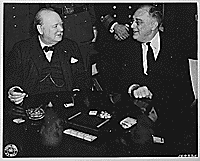 FDR realized when he made the decision to go through with Gymnast in 1942 that it meant that the cross-channel invasion might be delayed until 1944. Both Roosevelt and Churchill were adamant and stubbon about focusing on Germany first. The effectiveness of the German U-boat campaign in 1942 seemed to threaten Bolero, but plans continued. The operations in North Africa proved ot demand such a large amoutn of resources that Churchill was certain that no cross-channel invasion would occur in 1943, regardless of whether he wanted it to or not. Churchill and FDR decided to meet in Casablanca for a conference from June 14 to June 24 1943. Stalin was invited and encouraged to attend, but decided not to because of military pressure. However, his absence meant that the U.S. and Britain could focus on defeating the Axis powers in Europe. Once again, the U.S. wanted a cross-channel invasion in 1943, while Britain wanted to wait. However, the Americans were satisfied with the appointment of a planning command for the invasion. At the end of the conference, it was decieded that if Italy caved quickly, the cross-channel attack could occur in the fall of 1943. (17) In mid-May, Britain hoped that a quick Italian surrender would open up new options, meaning they still wanted to avoid the cross channel invasion. However, the Americans decided that Bolero would take precedence over all other operations. They wanted to keep the focus of the British and U.S. strategy on Western Europe instead of the Mediterranean. The Overlord plan, which oversaw the invasion of France, was targeted at March 1944. (18) In fact, the operation would take place on June 6, 1944.
FDR realized when he made the decision to go through with Gymnast in 1942 that it meant that the cross-channel invasion might be delayed until 1944. Both Roosevelt and Churchill were adamant and stubbon about focusing on Germany first. The effectiveness of the German U-boat campaign in 1942 seemed to threaten Bolero, but plans continued. The operations in North Africa proved ot demand such a large amoutn of resources that Churchill was certain that no cross-channel invasion would occur in 1943, regardless of whether he wanted it to or not. Churchill and FDR decided to meet in Casablanca for a conference from June 14 to June 24 1943. Stalin was invited and encouraged to attend, but decided not to because of military pressure. However, his absence meant that the U.S. and Britain could focus on defeating the Axis powers in Europe. Once again, the U.S. wanted a cross-channel invasion in 1943, while Britain wanted to wait. However, the Americans were satisfied with the appointment of a planning command for the invasion. At the end of the conference, it was decieded that if Italy caved quickly, the cross-channel attack could occur in the fall of 1943. (17) In mid-May, Britain hoped that a quick Italian surrender would open up new options, meaning they still wanted to avoid the cross channel invasion. However, the Americans decided that Bolero would take precedence over all other operations. They wanted to keep the focus of the British and U.S. strategy on Western Europe instead of the Mediterranean. The Overlord plan, which oversaw the invasion of France, was targeted at March 1944. (18) In fact, the operation would take place on June 6, 1944.Above Right: WWII; England, Europe; "Ready and waiting for D-Day". (NLR-PHOCO-65592(28)) from NAIL database
 On Novemer 8 1942, an Anglo-American force succesfully invaded North Africa, under the operation codename of Gymnast. Two days later, Churchill commented, "Now is not the end. Is is not even the beginning of the end. But it is, perhaps, the end of the beginning." However, the Allied victories that he had expected and counted upon had not occured. Although he did refer to Christmas Day of 1942 as a "brighter day than we have yet seen," it was clear to Churchill that the shift from defense to offense was in its beginning stages. Since the Soviet Union seemed on the verge of a successful offensive, the cross-channel invasion, codenamed Roundup, of Europe seemed to be both logical and prudent for both the U.S. and Britain. However, Churchill was still apprehensive about the assault in the beginning of 1943. On June 21 1942, Churchill arrived at the White House. His main reason for the trip was to discuss the second front issue and resolve the misperception of British support. Churchill worried that frustration regarding European strategy would result in a change of focus to the Pacific theater. However, there was no need for this worry. The Casablance Conference would help to ease Churchill's worries.(16)
On Novemer 8 1942, an Anglo-American force succesfully invaded North Africa, under the operation codename of Gymnast. Two days later, Churchill commented, "Now is not the end. Is is not even the beginning of the end. But it is, perhaps, the end of the beginning." However, the Allied victories that he had expected and counted upon had not occured. Although he did refer to Christmas Day of 1942 as a "brighter day than we have yet seen," it was clear to Churchill that the shift from defense to offense was in its beginning stages. Since the Soviet Union seemed on the verge of a successful offensive, the cross-channel invasion, codenamed Roundup, of Europe seemed to be both logical and prudent for both the U.S. and Britain. However, Churchill was still apprehensive about the assault in the beginning of 1943. On June 21 1942, Churchill arrived at the White House. His main reason for the trip was to discuss the second front issue and resolve the misperception of British support. Churchill worried that frustration regarding European strategy would result in a change of focus to the Pacific theater. However, there was no need for this worry. The Casablance Conference would help to ease Churchill's worries.(16)